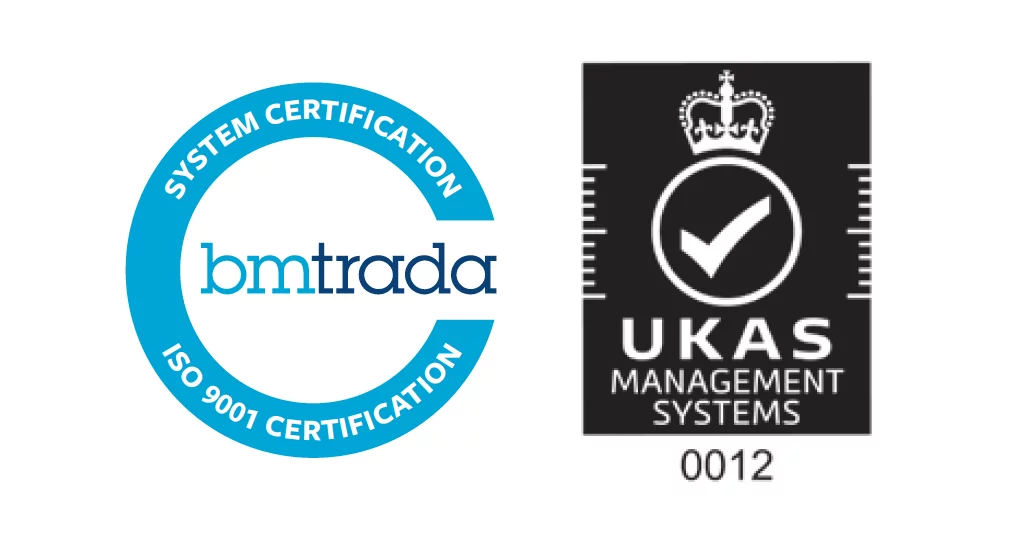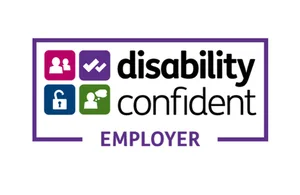Summary
Reducing inequalities is an urgent priority for the NHS, but the issues are complex and require rigorous approaches to finding inequalities before action can be taken. Simple analysis can lead to incorrect conclusions, but with data science techniques it is possible to identify and target inequalities at a local level.
Supporting NHSE, CF developed Actionable Insights, a tool that combines the technical rigour of a scientific study with clear interpretable outputs, so that NHS staff without technical backgrounds get the insight they need to effectively narrow inequalities.
The tool has had excellent user feedback, wide uptake and was a finalist in the 2023 HSJ Partnership awards for best analytics project. It shows how valuable data science products can be for addressing healthcare problems.
Exhibit 1: Actional Insights: Graphical summary
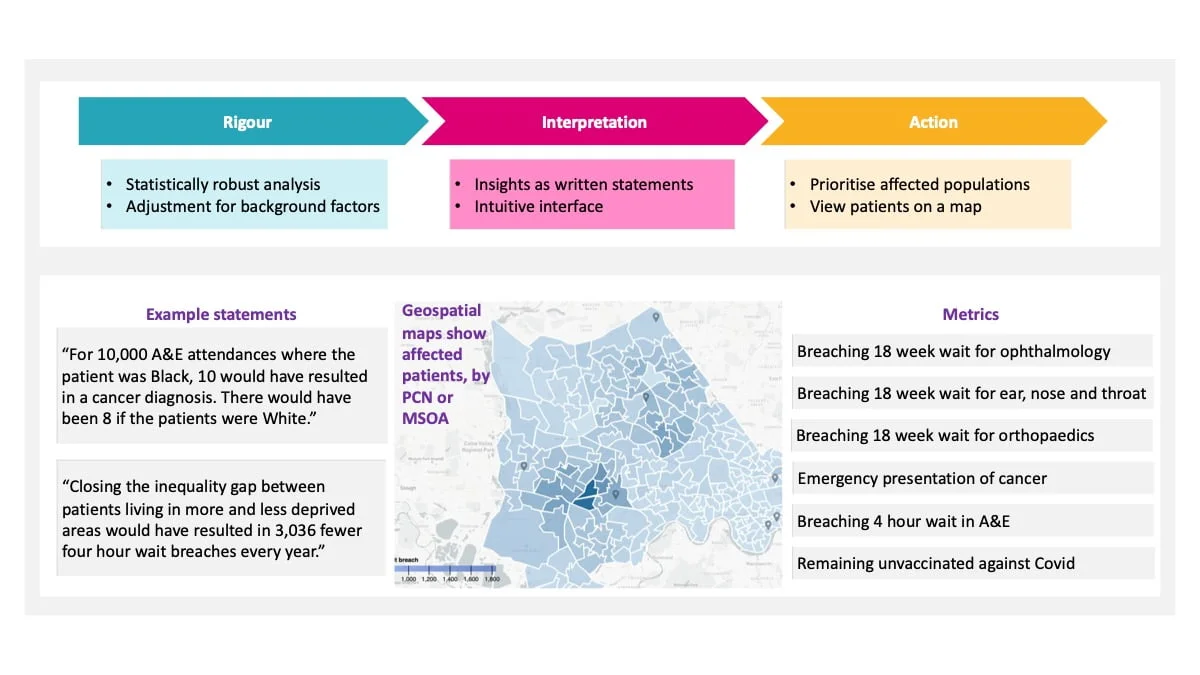
Context
The harrowing experience of Covid-19 revealed the shocking scale of health inequality across the UK and has provided a major impetus for the NHS to understand and address health inequalities. The vaccination programme was committed to ensuring uptake was both as quick and as equitable as possible. Anonymised, linked vaccination data at patient level underpinned this effort to understand uptake by ethnicity and deprivation at a local level. Data allowed the NHS and its partners in local authorities to pinpoint gaps, to understand how to encourage patients to get their jabs and to support healthcare professionals providing vaccination services. Reflecting on this experience, the NHS committed that it should extend this data-driven approach to how it pursued health inequalities in general.
A significant challenge is the vast quantity of data that needs to be analysed to understand and address health inequalities, with meaningful patterns almost impossible to detect directly. Our goal was to support NHS staff making evidence-based policy decisions.
Solution
Actionable Insights presents statistical insights in a clear interface, with automatically generated, interpretable sentences. Users can target initiatives with a granular geographical view of affected patients, aggregated by primary care network or by the area where patients live.
Users choose an ICS and select from six metrics, covering: emergency diagnosis of cancer, long waits for three elective specialties, covid vaccination and long A&E waits.
Regression models find whether deprived or ethnic minority groups have higher risk of negative experiences compared to less deprived or White patients. They also adjust for other factors, such as clinical need. Sentences for an ICS include:
- “Closing the inequality gap between Asian and White patients would have resulted in 4,642 fewer four hour wait breaches every year.”
- “For 100 A&E attendances where the patient was Asian, 37 would have resulted in waiting more than four hours. There would have been 33 if the patients were White.”
- “33.9% of Mixed ethnicity people are unvaccinated in this system.”
- “Based on the proportion of patients from this group affected, this system ranks 41 out of 42 systems, where 42 has the highest proportion.”
It was challenging to find the right phrasing for these insights, so that they were statistically correct but easily interpretable. We found users wanted to know the improvement opportunity size, the difference in risks for each group and how well a system was doing compared to others.
Exhibit 2: The Actionable Insights landing page: The user can choose an ICS and then read inequalities insights generated from statistical models applied to several metrics, such as cancer diagnosis in A&E.
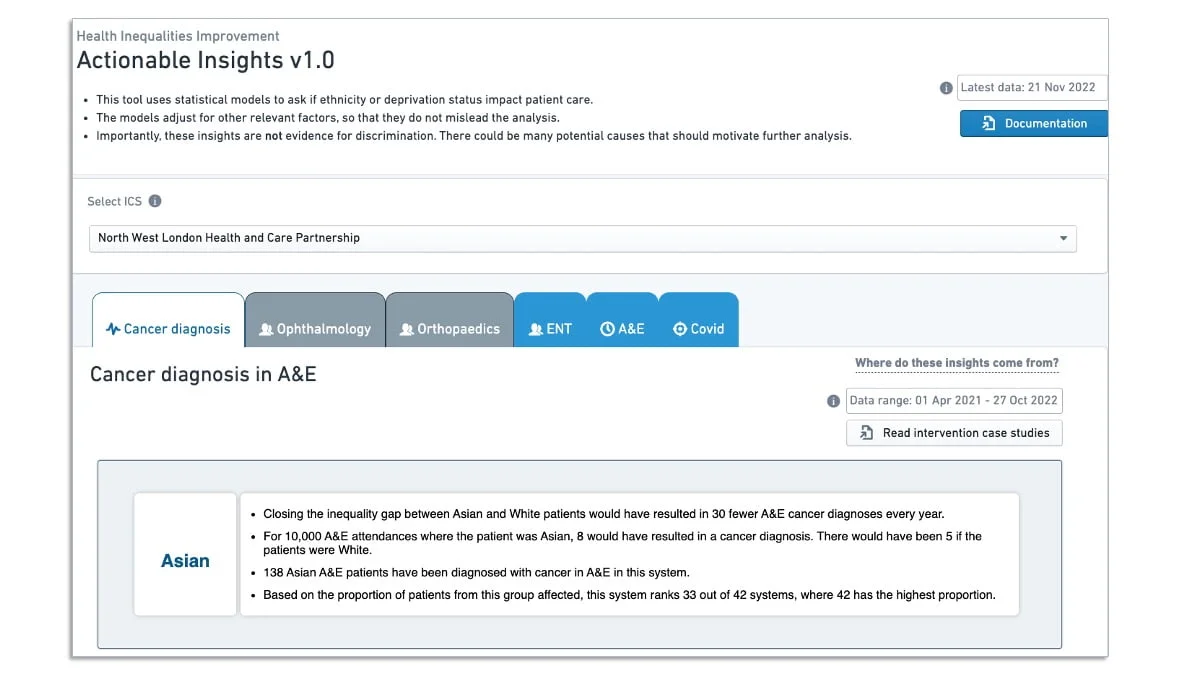
Exhibit 3: Map view of affected patients: After selecting a metric and a group experiencing an inequality, the user can see the distribution of the patients across the ICS. The maps show patient counts by area they live or by the primary care network they are registered with.
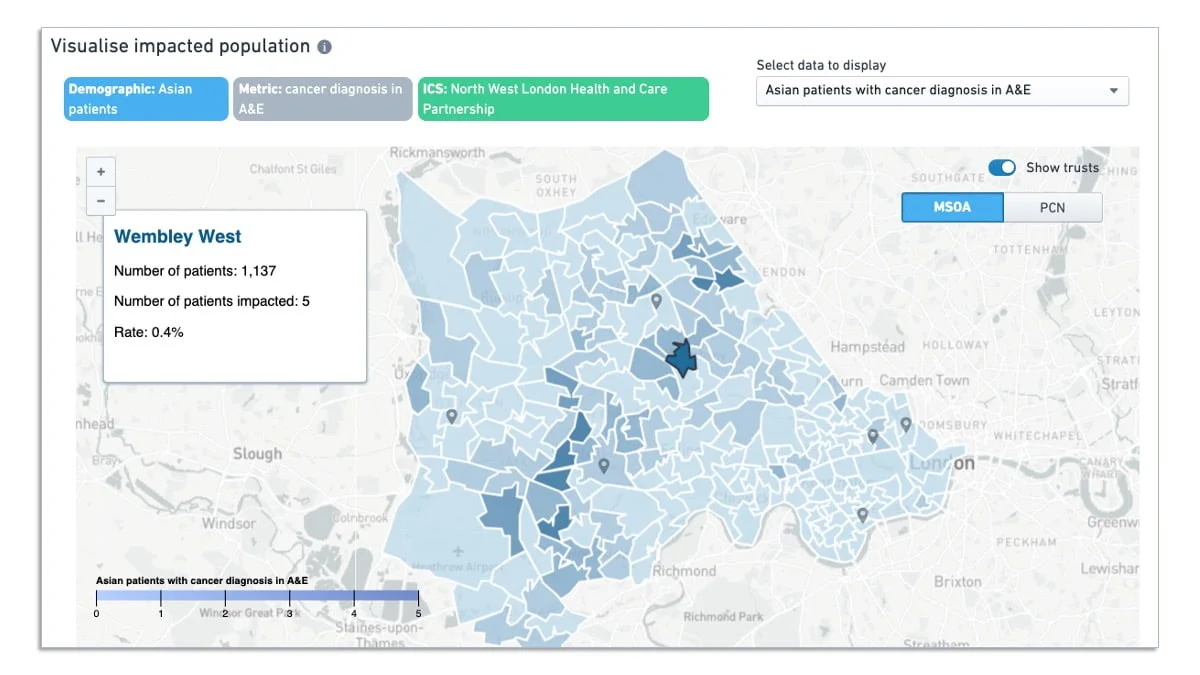
The project was technically ambitious, involving vast, patient-level datasets that required a sophisticated data pipeline and machine learning operations.
Neil Martin, NHSE Senior Product Manager on the project, said, “It’s the next step on from previous inequalities products, because it truly controls for different factors and lets you focus on patients in an area, rather than just showing the differences. It’s pioneering in that respect.”
Engagement and upskilling
We wanted to build the right tool for users, so we asked for feedback regularly by demoing prototypes in user interviews and a monthly 100+ engagement group. We also benefitted from regular NHSE senior expert input.
We introduced best practices to NHS analytical staff, including automatic code testing and monitoring deployed models. Jasneet Singh, NHSE Analytical Analyst said, “I definitely learned a lot, you showing me the models was really helpful. It was fascinating.”
Impact
Actionable Insights has averaged 60 unique monthly users since launch in summer 2022. Dr Russell Hills, Executive Clinical Director Surrey Downs HCP said, “I really like it. The statistical significance part makes it actionable”.
One user shared that systems are asked to focus initiatives on all potentially disadvantaged groups, without knowing which communities need support. They said the tool would help them prioritise their work and, “This is one of the best things I’ve seen in many years … great work, really fabulous”.
The NHS analyst community also stand to benefit from seeing the approach in action. Will Manners, Senior Analytical Manager said, “This [statistical approach] is what we want to move towards,” and it will “make analysts want to learn these methods.” Will’s team have since adopted Actionable Insights features in their work, including interactive map visualisation.
Client testimonial
CF worked closely with the NHS England health inequalities team, including Ranjit Senghera, NHSE Senior Health Inequalities Improvement Policy Delivery Lead. Ranjeet told us:
“Feedback from our users using the tool has been extremely positive and the insight that it provides has enabled regions and systems to take concerted and focused action. On this very challenging piece of work people found [CF’s] approach very helpful, insightful and informative.”

